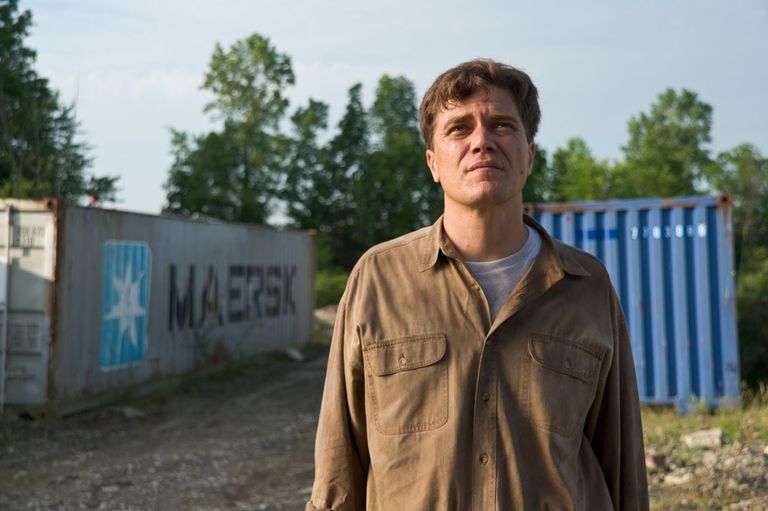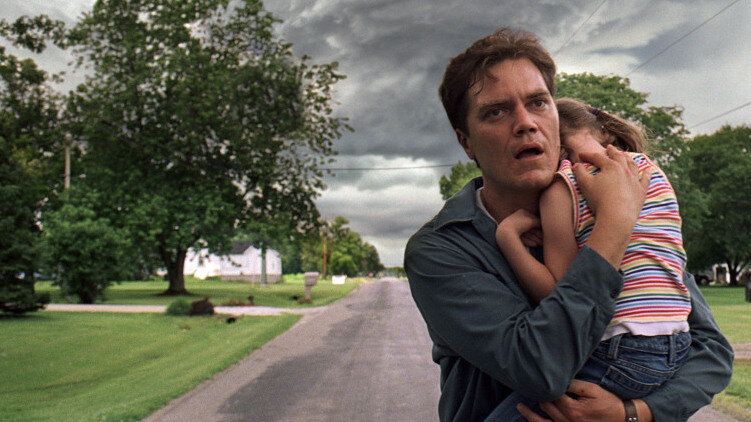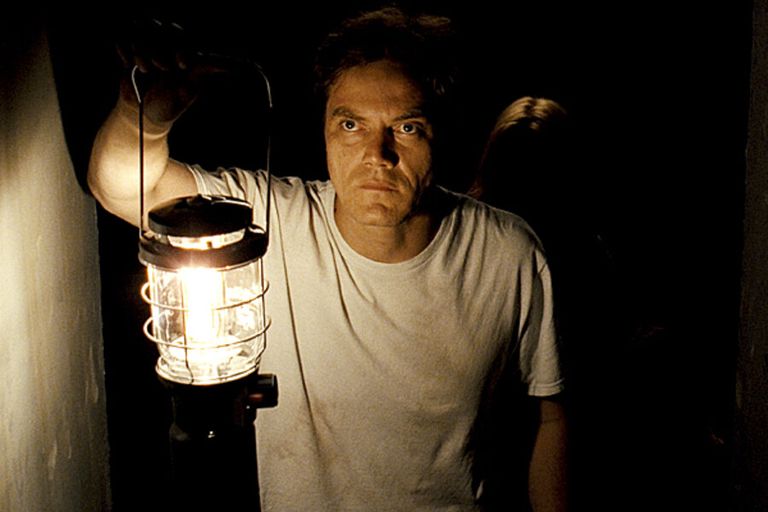Take Shelter’s story centres on a family facing terrible financial hardship; a situation that many people can sympathise with in the current climate of growing worldwide economic recession and resultant uncertainty as to what the future might bring. Curtis (Michael Shannon) works for a drilling company. He and his wife Samantha (Jessica Chastain) have a young daughter, Hannah (Tova Stewart), who is deaf. Money is tight but via Curtis’ work insurance they have managed to obtain the necessary funds to get Hannah what would be a life altering implant operation. However, things are not well with Curtis. He’s been having nightmares; apocalyptic dreams of a great storm that he comes to believe will tear his world apart. It’s when these nightmares start to spill over into reality he really begins to worry. There is a history of mental illness in his family with his mother (Cathy Baker) having been diagnosed with paranoid schizophrenia in her mid thirties. Curtis, now in his mid-thirties, half believes that he may be suffering from some kind of mental illness himself and seeks professional help. But he also half believes that these dreams may be visions. Portents of some very real environmental calamity that is fast approaching. So in order to ensure his family’s safety he begins work on a storm shelter.
It doesn’t happen often enough but just occasionally a movie comes along and something about it truly resonates on a deep and meaningful level touching the raw nerve of the times. Take Shelter is just such a movie and, as a result, for me, it was a very disquieting viewing experience. A movie like this lives and breathes based on how good the performances are. Michael Shannon and Jessicca Chastain give powerful, controlled performances here. Performances that, if I’m honest, elevate what could potentially have been, with other actors, just a good movie into the realms of something a little bit more special. Director Jeff Nichols has a lot to thank Shannon and Chastain for. The latter’s performance is so good here that I will immediately be seeking out some of her other work (she is reportedly fantastic in The Tree of Life) and will be keeping an eye on how her career develops. Hers is a subtle, natural performance that provides Take Shelter with its beating heart. In her own way she has a more difficult job than Michael Shannon, but that’s not to denigrate or downplay in any way what Shannon achieves here. This is, I think, the first time I’ve seen Shannon take on a lead role and he owns this movie with a magnetic performance that I hope will at the very least bring him a plethora of nominations come award season.
Throughout the movie there is an expertly sustained tension that builds from the opening scene into something that is as terrifying as it is moving. Watching this family disintegrate over the course of Take Shelter was, for me, a quietly devastating ordeal. Is Curtis suffering from some kind of genetic curse passed down to him from his mother? Or are his dreams, both while in the arms of sleep and during his waking hours, truly visions and, if so, when the storm hits will it be an actual environmental catastrophe or something more nebulous? Are his dreams a metaphor, perhaps, for the growing anxieties that have triggered his psychosis? I’ll be honest. Watching this family being torn apart at times had me hoping that an actual environmental disaster was on it’s way. Because the alternative, that Curtis was actually suffering from some kind of mental collapse, was in a lot of ways more upsetting. Most would not consider Take Shelter a horror movie. It isn’t in the broad sense, but I would argue that the internalised horror it presents is far scarier than any zombie, vampire or maniac with a knife movie I’ve seen. Horror as a genre has been largely done a disservice by cinema in terms of scope. There are exceptions to this rule and Take Shelter is a good example of this.
I’m going to try not to wander too far into spoiler territory in this review, but the movie is riveting from start to almost finish. Almost finish? What do I mean? Let me explain.
The only thing wrong with Take Shelter is that it’s about seven minutes longer than it should be. There’s a moment, a perfect moment, and it’s at this point the movie should have ended. Fade to black. Roll end credits. I would have left the cinema totally satisfied. It is within the closing, totally unnecessary, seven minutes that the movie tries to have it’s cake and eat it too. My take on the movie up until this point was that Shannon’s character was indeed beset by some kind of psychological episode and that all of the dreams and waking visions were merely the result of someone buckling under the dual pressures of financial hardship and the resultant triggering of some kind of flaw in the fabric of his mental equilibrium. Within the last seven minutes, and in particular during the closing moments, Jeff Nichols makes a big mistake and decides on behalf of the viewer what type of movie this is. It’s truly disappointing that he lacked the courage to go out on a less defined note. I typically enjoy movies that have a degree of ambivalence about them, movies that encourage the viewer to find his or her own answers as to what they were about. The ending of Take Shelter, in my opinion, lacks courage and the result is that the movie is not entirely successful in what it seems to be trying to accomplish. This is especially frustrating as it comes so close to achieving so much only for it to create for itself an unfortunate Achilles’ heel of an ending.
However, this is not to decry what it does achieve. Up until those closing minutes this movie had everything going for it. Stunning performances. Some terrifying and evocative visuals. A steady pace punctuated by moments of unease that gradually accumulate into a sense of all consuming dread. This is a movie that manages to grab hold of the zeitgeist and twist it into something powerfully bleak and disconcerting. The gnawing anxiety I felt while watching Take Shelter, a feeling that hasn’t really left me in the hours since, is testament to how effectively it holds a mirror up to the current fears that affect all but the most fortunate in society. For that it should be applauded.


